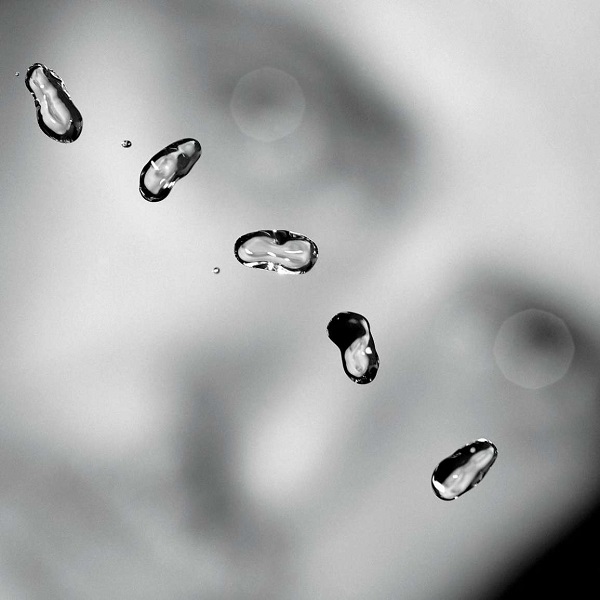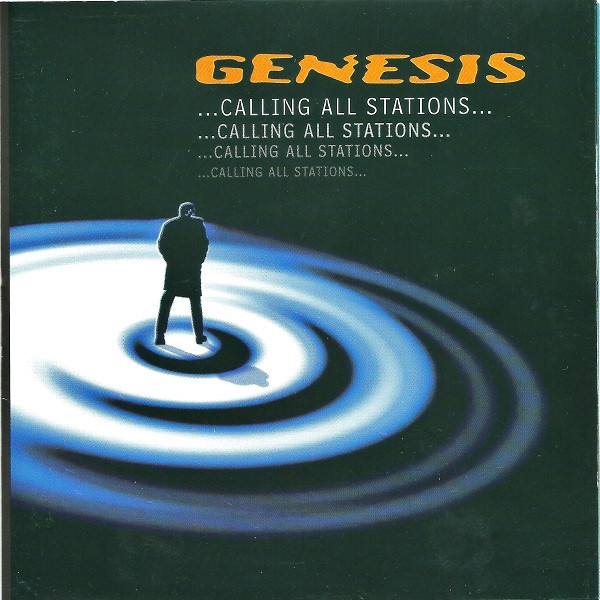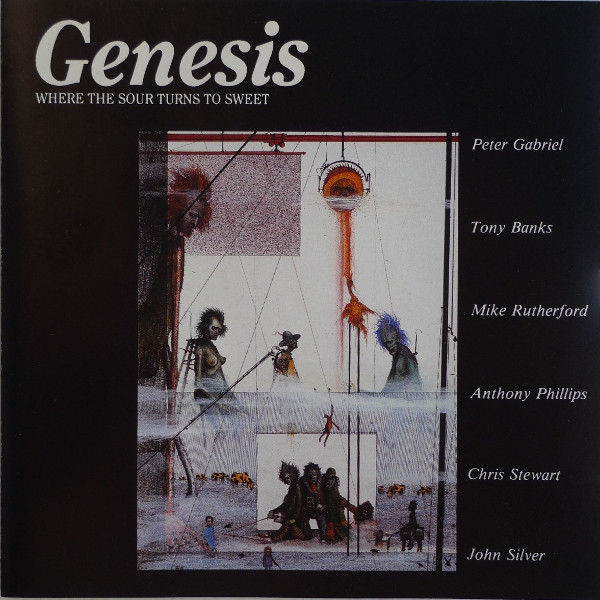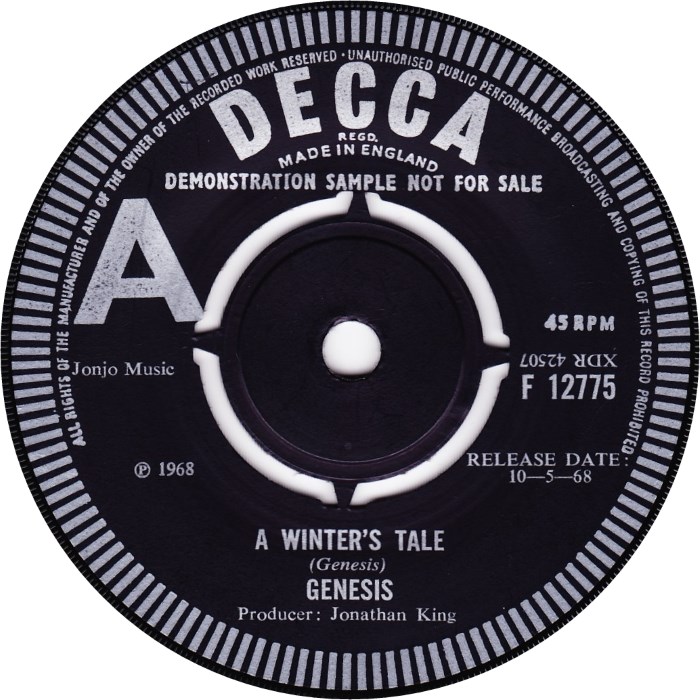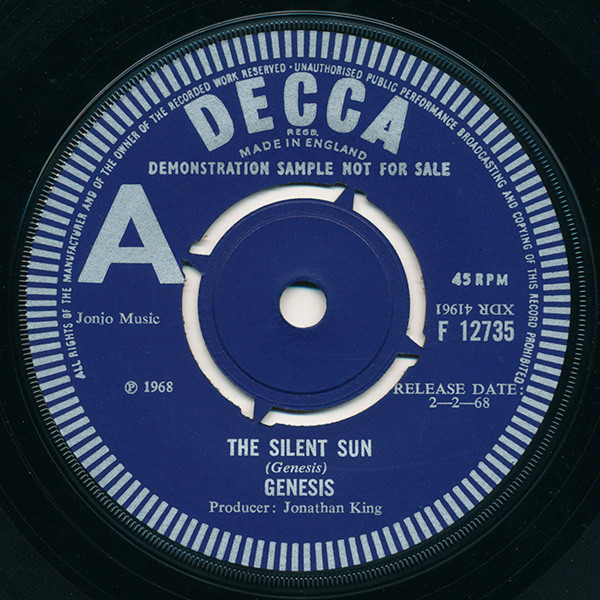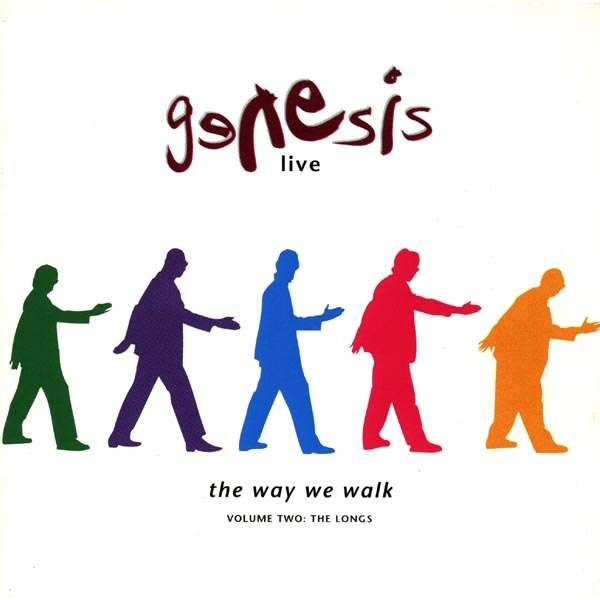On 23 September 2002, Peter Gabriel’s album Up was released.
Continue reading “Up (2002) – Peter Gabriel”Calling All Stations (1997) – Genesis
After Phil Collins’ departure from Genesis in 1996, the remaining two members Tony Banks and Mike Rutherford kept writing music and hired a new singer: Ray Wilson, born in 1968, known as lead vocalist of the band Stiltskin.
Continue reading “Calling All Stations (1997) – Genesis”Where the Sour Turns to Sweet (1969) – Genesis
In June 1969, Genesis released their third and final single for Decca Records: “Where the Sour Turns to Sweet” backed with “In Hiding.” It was intended to spark interest in their debut LP From Genesis to Revelation, but like its predecessors, it went largely unnoticed.
From Genesis to Revelation
By this point, Genesis had already released two singles on Decca: “The Silent Sun” and “A Winter’s Tale,” both in 1968 and both produced by Jonathan King. King also produced the band’s first full-length album, From Genesis to Revelation. The lineup at the time featured Tony Banks (keyboards), Peter Gabriel (vocals), Anthony Phillips (guitar), Mike Rutherford (guitar/bass), and John Silver (drums).
The album, loosely a concept work about the history of mankind, was still musically rooted in soft pop rather than progressive rock. Much to the band’s dismay, King added string arrangements to many tracks, softening the overall sound and steering it further from the band’s original vision.
Like the singles before it, the album failed to attract significant attention. In an effort to salvage interest, Decca decided to release a third single from the LP: “Where the Sour Turns to Sweet.”
Where the Sour Turns to Sweet
The track had actually been part of Genesis’s live repertoire for a while. Back in 1967, they recorded it, along with three other songs, during a one-hour session at Regent Sound Studios in London (where many rock legends had also worked). Jonathan King brought the young band in to record a demo, which was then sent to Decca. The label was impressed, and the band was signed.
They attempted to re-record “Where the Sour Turns to Sweet” at Advision Studios as their debut single, but the session was a disaster. Inexperience on both the band’s and producer’s parts led to the idea being shelved. Instead, “The Silent Sun” and “A Winter’s Tale” were released the following year, along with the full album in 1969.
Finally, on June 27, 1969, “Where the Sour Turns to Sweet” was released as a single (using the album version) with “In Hiding” as the B-side. It became Genesis’s third and last Decca single. Like the others, it failed to chart. There were even plans to release a remixed version of “In the Beginning” as a fourth single, but they never materialized.
Musical Highlights
“Where the Sour Turns to Sweet” opens with a bluesy piano phrase and finger snaps, giving it a laid-back, jazzy feel. Unfortunately, Arthur Greenslade’s added strings somewhat obscure the song’s raw energy. Peter Gabriel’s voice, even at this early stage, stands ou. His playful delivery and dynamic phrasing give the lyrics character and charm. It’s arguably one of the album’s standout tracks, though the fade-out feels abrupt and slightly uninspired.
Tony Banks and Tony Blackburn
Keyboardist Tony Banks once recalled being sent out to accost BBC DJ Tony Blackburn on the street to persuade him to play the single on his radio show (though Mike Rutherford claims that this was done when “A Winter’s Tale” was released.) “I told him, ‘Well, don’t play the A-side—play the B-side,’” Banks later said, referring to “In Hiding.” The situation was awkward for everyone involved, but the band was desperate enough to take the chance.
The End of the King Era
By the end of 1969, after three underwhelming singles and an album that missed the mark, Genesis was ready to move on. Jonathan King had taken the group as far as he could. The band withdrew to the countryside to reflect and write new music that would take them in a very different, much more adventurous direction.
Still, King left them with one important legacy: the name Genesis.
A Winter’s Tale (1968) – Genesis
On 10 May 1968, Genesis released their second single. Like its predecessor – and its successor – it failed to make an impact. Here’s the story behind A Winter’s Tale.
In 1968, Genesis were still schoolboys. The four classmates from Charterhouse were in their late teens when producer Jonathan King offered them a record deal. Tony Banks (keyboards), Peter Gabriel (vocals), Anthony Phillips (guitar), Mike Rutherford (guitar and bass), and Chris Stewart (drums) agreed. King chose to produce their first album himself, and it was he who came up with the name “Genesis,” symbolising both the band’s beginning and the start of his own career as a producer.
The first singles
Genesis had been writing pop songs while still at school, but by the time they signed their deal, they were already moving towards more adventurous material. Jonathan King, however, preferred straightforward pop. So, to please him, Tony Banks and Peter Gabriel wrote The Silent Sun, a deliberate nod to the Bee Gees, which King loved and released as their debut single. It flopped.
A Winter’s Tale
For their second single, A Winter’s Tale, Tony Banks and Peter Gabriel again collaborated. Like The Silent Sun, it’s a love song, but here, the band sounds more confident, particularly in the soaring chorus. Once again, Peter Gabriel’s distinctive voice takes centre stage, rising above a lush (and somewhat overpowering) string arrangement. Even at this young age, Gabriel’s vocal strength hinted at the frontman he would soon become.
Unfortunately, A Winter’s Tale also failed to chart. It received little radio play and only a couple of published reviews. New Musical Express praised the song’s “pulsating crescendo” and thoughtful lyrics, but continued: “The melody could have done with a little more substance.”1
Mike Rutherford recalls in his autobiography that the band brainstormed ways to boost airplay. Peter Gabriel suggested they hand the single directly to BBC Radio 1 DJ Tony Blackburn. Tony Banks was tasked with waiting outside Broadcasting House. Nervous and unsure, he apparently came across a little too forcefully when Blackburn emerged – likely startling him and not helping their cause.2
From Genesis to Revelation
Shortly after the release of A Winter’s Tale, drummer Chris Stewart left the band and was replaced by John Silver, who would record their debut album From Genesis to Revelation. The album was an ambitious concept piece about the history of mankind, but musically, it still leaned far more towards soft pop than progressive rock. To the band’s disappointment, King added even more lush string arrangements, giving the album a gentle, almost easy-listening feel.
A third single, Where the Sour Turns to Sweet, followed, but like the others, it failed to chart. Eventually, the growing divide between King’s pop sensibilities and the band’s evolving musical ambitions led them to part ways.
What remains from this era is a fascinating and surprisingly strong collection of songs recorded by a band still in their teens. Among them is A Winter’s Tale, a glimpse of what was to come.
(And as a footnote for collectors: there’s a curious story about a cover version of A Winter’s Tale by Rita Pavone’s brother – but that’s a tale for another time.)
3×3 (EP, 1982) – Genesis
In May 1982, Genesis released 3×3, an extended play featuring three songs left over from the Abacab sessions – tracks that did not make it onto the album but were too good to shelve.
Three Unreleased Songs from the Abacab Sessions
Abacab (1981) marked a turning point for Genesis. With a new producer, Hugh Padgham, and their newly purchased studio – The Farm in Surrey – the band had the freedom to jam, experiment, and refine their sound. When the album was finalized, they found themselves with a few strong tracks that had not made the cut. Rather than letting them go to waste, they chose to release them on an EP the following year.
The songs – Paperlate, You Might Recall, and Me and Virgil – were all co-written by Tony Banks, Phil Collins, and Mike Rutherford. The 3×3 EP came out in May 1982, between two major tours. In the U.S., it was never released as an EP; only Paperlate appeared as a single, with You Might Recall on the B-side.
The Songs
Paperlate shares a similar vibe with No Reply at All from Abacab – funky, upbeat, and driven by the Earth, Wind & Fire horn section, who had also worked with Collins on his solo debut Face Value. The title “Paperlate” comes from a lyric in Dancing with the Moonlit Knight (from Selling England by the Pound, 1973). During a soundcheck in either 1978 or 1980, Phil kept repeating the line “Paperlate cried a voice in the crowd…”, which eventually sparked the idea for a new song.
You Might Recall is a more romantic tune, stylistically close to some of Mike Rutherford’s earlier ballads like Alone Tonight.
The final track, Me and Virgil, is a storytelling piece reminiscent of Deep in the Motherlode (1978). This time, it was Collins who penned a Wild West narrative, with the band attempting to capture the spirit of The Band. However, Collins later expressed dissatisfaction with the track, and it was notably left off the Genesis Archive 2 box set in 2000.
Beatles-Inspired Artwork
The EP’s cover art was a playful homage to the Beatles’ 1960s EPs, particularly Twist and Shout. Genesis even brought in Tony Barrow, the Beatles’ former press officer, to write the sleeve notes in a cheeky, retro style (“These cheeky chappies from Guildford…”).
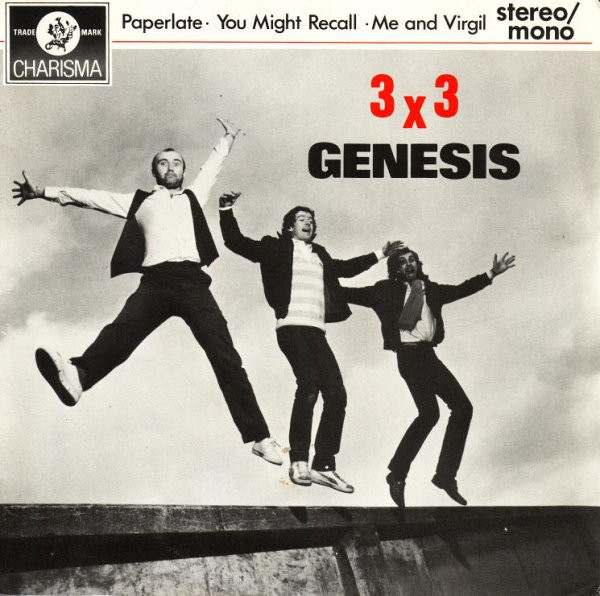
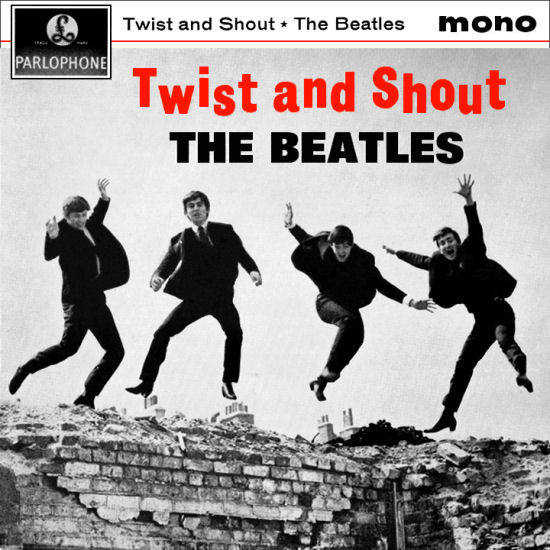
Not everyone got the joke. One reviewer, unaware of the Beatles reference, assumed the design was serious. But fans appreciated the nod, and the band’s sense of humor shone through once again. The EP was a hit in the UK, and Paperlate earned the band another appearance on Top of the Pops, with the EP reaching No. 10 on the charts.
Three Sides Live and the U.S. Version of 3×3
Later that year, Genesis released the live album Three Sides Live. Since EPs did not sell particularly well in the U.S., the band opted to include the 3×3 tracks on the album’s fourth side instead of releasing them separately. To round out that side, they added two outtakes from the Duke sessions: Open Door (by Rutherford) and Evidence of Autumn (by Banks). The UK version, in contrast, featured a full fourth side of live material.
3×3 was never released as a standalone CD. However, Paperlate and You Might Recall were included in the Genesis Archive 2: 1976–1992 box set in 2000, which featured many previously unavailable tracks. All three EP songs, including a remixed Me and Virgil, were later made available on CD in the Genesis 1976–1982 box set.
The Silent Sun (1968) – Genesis
In February 1968, Genesis released their debut single, The Silent Sun, on Decca Records. At just 17 years old, Peter Gabriel was already making his mark. Let’s take a closer look at the band’s very first single!
Genesis at Charterhouse
In 1968, Genesis were still students at Charterhouse School. Tony Banks, Peter Gabriel, Mike Rutherford, and Anthony Phillips had formed the band as a way to escape the constraints of school life. At the time, the group operated as two songwriting pairs: Banks and Gabriel on one side, Phillips and Rutherford on the other.
While still at school, they recorded demos and sent them to Jonathan King, a former Charterhouse student who had found success as a musician and producer (his best-known hit being Everyone’s Gone to the Moon). King was particularly impressed by Peter Gabriel’s voice and signed them to Decca Records, intending to produce a full album. However, when the band presented their next batch of demos, he wasn’t impressed.
A Producer Who Loved The Bee Gees
Jonathan King wanted the band to deliver a potential hit. Knowing he was a fan of The Bee Gees, Peter and Tony deliberately wrote a song in their style—The Silent Sun.
‘I tried my best Robin Gibb impersonation,’ Peter later joked.1
King loved it and made it their debut single, later including it on the band’s first album, From Genesis to Revelation.
Musically, The Silent Sun blends folk and pop, with Tony Banks’ piano already playing a central role. The song primarily highlights Peter’s vocals, with orchestral strings added later by King in the studio. It’s also one of the rare official Genesis recordings to feature their original drummer, Chris Stewart.
‘We had been drilled by Jonathan King to write short pop songs, which I resisted,’ Anthony Phillips recalled. ‘I didn’t like The Silent Sun at all.’ He later reflected that it was probably for the best that the song wasn’t a hit: ‘If it had been successful, the band would never have developed its proper style.’2
Tony Banks, however, believed it had the potential to be a great hit. For Peter Gabriel, seeing the name Genesis in Record Mirror was a career-defining moment, while Mike Rutherford fondly remembers the thrill of hearing The Silent Sun on the radio for the first time in Anthony Phillips’ kitchen.
Reviews and Reception
Upon release, the Decca catalogue described The Silent Sun as ‘quietly attractive.’’.3 New Musical Express praised its ‘beautiful flowing arrangement of violins and cellos,’ though they speculated it ‘might be a bit too complex for the average fan.’4
A Single That Failed but a Band That Flourished
Despite their enthusiasm, The Silent Sun failed to chart. The accompanying album, From Genesis to Revelation, was also a commercial failure. Eventually, Genesis parted ways with Jonathan King, allowing them to explore a more adventurous and distinctive musical direction.
As the band gained fame, King repeatedly re-released these early recordings in various formats, capitalizing on Genesis’ later success. But for Genesis themselves, The Silent Sun remains a fascinating footnote in their history—their first step on the road to greatness.
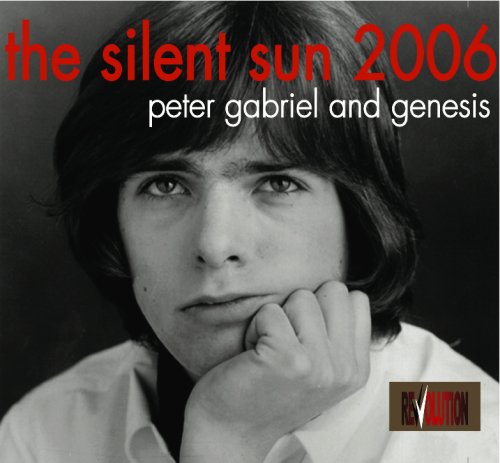
Sources
GENESIS REUNION 2014: THE THREE. Part ONE. NOW FULL UNCUT VERSION ! + improved audio!
Thompson, Dave, Turn it on again. Peter Gabriel, Phil Collins & Genesis. (San Francisco: Backbeat Books, 2005).
Face Value (1981) – Phil Collins
In February 1981, Phil Collins unveiled his debut solo album, Face Value, marking a significant departure from his role as Genesis’s frontman. The album not only showcased Collins’s personal and musical evolution but also cemented his status as a prominent solo artist in the 1980s.
Genesis and Personal Turmoil
By 1978, Collins had transitioned from Genesis’s drummer to its lead vocalist. The band’s 1978 album, …And Then There Were Three…, featured the hit “Follow You Follow Me,” signaling a shift towards more concise and direct songs. During this period, Collins faced personal challenges; his wife, Andrea, threatened to leave due to his extensive touring commitments. Upon returning from a tour, Collins discovered that Andrea had moved to Canada with their children. Despite efforts to reconcile, including a move to Vancouver, the marriage ended in divorce.
Creation of Face Value
In the aftermath of his divorce, Collins channeled his emotions into music. He set up a home studio in Surrey, equipped with a piano, drum machine, and an 8-track tape recorder. Here, he began crafting demos that delved into his personal experiences. When Genesis regrouped to work on their 1980 album, Duke, Collins presented some of these demos. Two tracks, “Misunderstanding” and “Please Don’t Ask,” were included in the album. Encouraged by the positive reception, Collins decided to pursue a solo project, collaborating with producer Hugh Padgham to develop his demos into a full-length album.
Musical Diversity and Notable Tracks
Face Value is a tapestry of various musical styles, reflecting Collins’s diverse influences. The opening track, “In the Air Tonight,” is renowned for its haunting atmosphere and the iconic drum break that has since become legendary. The song’s lyrics were largely improvised, capturing the raw emotion of the moment.
Another standout track, “I Missed Again,” introduces a brass section featuring the Phenix Horns, known for their work with Earth, Wind & Fire. This collaboration infused the song with a vibrant, funky energy, a sound that would become a hallmark of Collins’s future solo endeavors.
The album also explores a range of genres:
“The Roof Is Leaking”: A track with Delta blues and country influences, adding to the album’s eclectic nature.
“You Know What I Mean”: A poignant ballad showcasing Collins’s vulnerability, accompanied solely by piano and vocals.
“Hand in Hand”: An instrumental piece blending jazz and world music elements, highlighting the talents of the assembled musicians.
Commercial Success and Legacy
Upon its release, Face Value received critical acclaim and achieved significant commercial success. The album topped the UK Albums Chart for three weeks and reached No. 7 on the US Billboard 200. It has since sold over 5 million copies in the US and over 1.5 million in the UK. The success of Face Value not only established Collins as a solo artist but also set the stage for a series of successful albums throughout the 1980s.
In retrospect, Face Value stands as a testament to Phil Collins’s ability to translate personal adversity into a universally relatable and sonically diverse album. Its enduring appeal lies in its raw emotion, innovative production, and the seamless fusion of various musical styles.
The Longs (1993) – Genesis
Released in January 1993, Live – The Way We Walk, Volume Two: The Longs marked the end of an era for Genesis. Not only was it the band’s last release with Phil Collins before his departure, but it also became their final UK number-one album. As the second volume of the The Way We Walk live series, The Longs captured the epic and progressive side of Genesis, contrasting with Volume One: The Shorts, which focused on the band’s chart-topping hits.
Continue reading “The Longs (1993) – Genesis”
